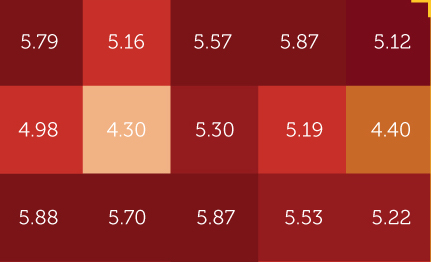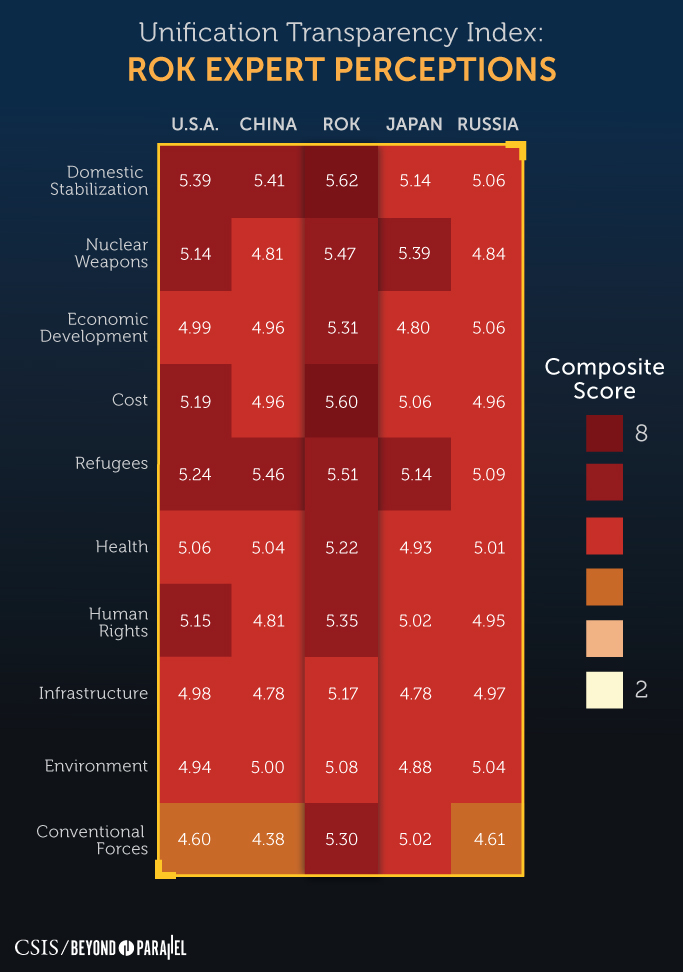
Unification Transparency Index: South Korea
How Much Do We Know About Unification?
Beyond Parallel has created the first-ever database of expert assessments that tries to quantify how much we know about unification. While it has become commonplace to say that there are many “unknowns” and “dangers” associated with Korean unification, these variables have never been measured and remain cloaked in opacity. How much do the United States (survey of U.S. perspectives available here), South Korea, China, and other regional powers know about the long-term issues associated with Korean unification? How strongly do countries in the region perceive such issues to be important to their own national interests?
To begin quantifying these variables, Beyond Parallel conducted a breakthrough pilot survey study with South Korean policy experts, government officials, scholars, and opinion leaders. A total of 108 responses were collected for the survey conducted in fall 2016 through spring 2017. The results of this survey may help guide future study and planning for Korean unification by serving as baseline numbers and quantitative markers for comparison.

South Korea’s Unification Transparency Index
Domestic stabilization is the largest potential unification blind spot for South Korean officials and experts, registering a 5.62, the highest composite score for the ROK. This means civil-military relations, law and order, and stability in the North represent the issues for which Koreans see great consequences for national interests, but for which they have relatively little prior knowledge or understanding. Costs related to unification rank a close second for South Koreans at 5.60, followed by 5.51 refugees, 5.47 nuclear weapons, and 5.35 human rights.
The blind spot score on any given unification issue represents the composite score of 1) the perceived level of concern and 2) the perceived level of knowledge. The level of concern gauges experts’ perceptions of an issue’s importance to each country’ national interest as it relates to the Korean peninsula. The highest levels of concern were scored a 4 (vital), while the lowest levels of concern scored a 1 (no bearing at all). The second half of the blind spot scores is composed of expert’s perceptions of knowledge defined as the amount of empirical evidence, analysis, and scholarly literature available to each country on which to base policy decisions. The worst levels of knowledge were scored a 4 (no amount), while the best levels were scored a 1 (abundant amount). To better understand the dynamics driving the perceptions of South Korea’s unification blind spots, it is useful to examine the breakdown of South Korean officials’ and experts’ levels of concern and knowledge on each of the issues.
Along the former metric, 85 percent of South Korean respondents said nuclear weapons were vital to their national interest, followed by 75 percent saying the same for the disposition of the North’s conventional military forces. 74 percent of South Korean respondents said unification costs were of vital concern, and 68 percent said the same of domestic stabilization. Nearly half of respondents said economic rehabilitation and refugees were vital to South Korean national interests, garnering 51 percent and 45 percent of responses respectively. One-third of South Korean respondents perceived human rights/transitional justice as vital to ROK interests. DRR issues such as infrastructure, health, and the environment were perceived to be of lower importance to ROK national interests relative to the rest of the issues. The percentage of respondents indicating these issues were vital to South Korean national interests was 27 percent, 17 percent and 10 percent, respectively.
The Beyond Parallel survey found there were some gaps in the amount of empirical evidence and analysis available to South Koreans. While South Koreans rank security and cost issues as highly consequential to their national interests, they feel that they have the least knowledge and understanding related to specific DRR issues of health and the environment. Only 7 percent and 5 percent of respondents, respectively, said South Korea had abundant levels of knowledge on these issues. In contrast 51 percent of South Korean respondents felt empirical evidence was abundant for North Korea’s conventional forces. 50 percent said the same of nuclear weapons. Cost received a paltry 35 percent of respondents, indicating abundant knowledge was available despite the fact that three-quarters of them believed it was a topic vital to national interests.
File "/nas/content/staging/korea/wp-content/uploads/2016/09/ROK-Responses_Level-of-Knowledge-Breakdown.xlsx" does not exist.
The Beyond Parallel survey highlights a potential contradiction between South Korean views of domestic stabilization and the issues of health, environment, and infrastructure. The outbreak of pandemic diseases, large-scale natural or man-made disasters, and collapse of infrastructure in a unification scenario would make it extremely difficult to establish domestic order. And yet, the issues of health, environment, and infrastructure received the lowest South Korean composite score rankings in the index while domestic stabilization received the highest. If the lack of knowledge and concern for health, environment, and infrastructure issues results in reduced policy discussion and disaster preparedness it could have dire consequences for domestic stabilization. South Koreans may not be entirely aware of the significance that these issues could carry for domestic stability. This points to a need for further discussion on the issues of health, environment and infrastructure and the formulation of disaster risk reduction plans.
South Korea also estimates that for China the largest blind spot with unification is refugees followed by domestic stabilization, placing both more than one standard deviation above its average blind spot score. Health and environment ranked a distant third and fourth. These issues would all likely have the most direct impact on China in a unification scenario. Ironically, South Korea assigns more consistency to Chinese views than their own in that all four of China’s top priorities are arguably interrelated DRR issues, the handling of which could impact the severity of the refugee problem.
As with China, the ROK assigns more logical consistency to Russian views on unification than its own, ranking the top four blind spots as (1) refugees, (2) economic development, (3) domestic stabilization, and (4) the environment. Management of each of these DRR issues would directly impact refugee flows and stability on Russia’s border with a unified Korea.
How to Understand the Index?
In the Unification Transparency Index, blind spots are a composite measure based on two variables from the Beyond Parallel pilot survey of experts and policymakers. The first variable assessed is the relative level of importance for a unification-related topic to the national interests of the United States, Japan, South Korea, China, and Russia as it relates to the Korean peninsula. The highest levels were scored a 4 (vital to national interests). Responses that indicated an issue was “of importance, but not vital” to national interests scored a 3, “of low importance” scored a 2, and the lowest levels scored a 1 (no bearing at all). The second variable assessed the amount of knowledge, which is defined as empirical evidence, analysis, and scholarly literature each country has on the issues on which to base their policy decisions. Here the highest levels of knowledge were scored a 1 (abundant empirical evidence). Responses that indicated there was a “sufficient amount” of empirical evidence scored a 2, “insufficient amount” scored a 3, and the lowest levels of knowledge were scored a 4 (no empirical evidence).
The results from these two variables were averaged and then combined to produce a composite measure of blind spots for each country on the 10 selected unification issues. The higher the score, the deeper the shade of red in the Index, and the larger the blind spot is for that issue.
The largest blind spots are at the nexus of a complete lack of empirical evidence and yet are seen as vital to national interests.
The unification issues with the largest blind spots are those at the nexus of a complete lack of empirical evidence (4) and vital to national interests (4)—a recipe for potential disaster. On the other end of the spectrum, the smallest blind spots result from issues with no bearing on national interests (1) but with abundant empirical evidence (1). The initial findings from the Index will help set the research agenda as Beyond Parallel seeks to build greater knowledge and increase available empirical evidence in each of these critical issues.
This unique Beyond Parallel data set will eventually be expanded to include—in addition to U.S. and South Korean expert perceptions—survey results of experts, officials, scholars, and opinion leaders from all five countries in the Index to offer a comprehensive assessment of what we do and do not know about unification. 
